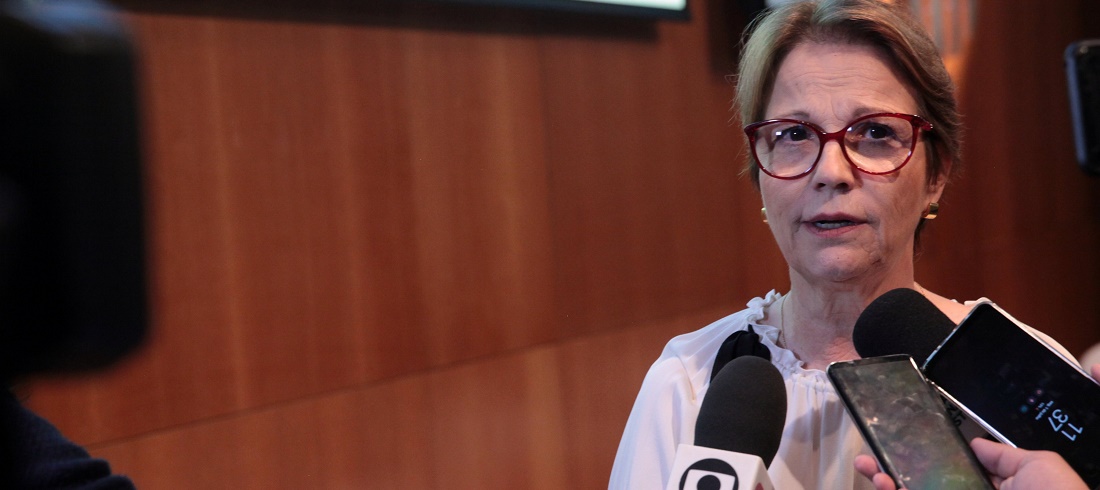
Mercosur-EU agreement to increase competitiveness of Brazilian agriculture
Jul, 04, 2019 Posted by datamarnewsWeek 201928
The agreement between Mercosur and the European Union (EU) will modernize and increase the competitiveness of Brazilian agriculture, said Minister Tereza Cristina (Agriculture, Livestock, and Supply) on Wednesday (07/03). In a press interview, she said the agreement will allow the country’s products to become more attractive and reach a market of approximately 700m people.
“It will bring to Brazil a quest for more quality and competitiveness to access this market, which is a market accessed by countries such as Canada and Korea. Brazil will be on equal footing,” said the minister.
Acordo Mercosul-União Europeia. O que ele representa para a agricultura brasileira? E como impacta a vida do cidadão?
Via @planalto @governodobrasil pic.twitter.com/dDEp2fUCLq— Tereza Cristina (@TerezaCrisMS) July 3, 2019
In addition to making exports to the European Union more accessible to large producers, the minister said the government’s intention with the partnership is to put small and medium-sized producers at a level so that they can reach that market. “We will bring this possibility to those agricultural products that are already very competitive within the gate.”
Precautionary Principle
The Secretary of Commerce and International Relations, Orlando Ribeiro, explained the inclusion of the precautionary principle in the agreement. According to him, this was a central element for the agreement to be signed. “We kept the expression but completely encapsulated any possibility of using the principle against Brazil. We seek guarantees to avoid or reduce the risk of such abuse that would justify barriers to trade,” he said.
The secretary explained that in theory, the precautionary principle allows a country to reject the import of a product on the grounds that it is harmful to human health and the exporting country has to prove otherwise. “If we accepted in the original sense, whenever we were exporting the Europeans could say that they did not want to import a product because they think it is bad for their health.”
However, express clauses were included in the negotiations to avoid arbitrary restrictions. Thus, in the Mercosur-European Union agreement, there will be a need to base the measures on scientific evidence. If this evidence is inconclusive, the application of the device was restricted to situations that occur in the territory of the party applying the measure, which should also assume the burden of proof.
Aliquots
Orlando Ribeiro recalled that, with the agreement, 82% of Brazilian agricultural exports will remain at zero tariffs in ten years. “The agreement covers 99% of exports. The minimum with quotas is left and the quotas are quite generous. Rice, for example, was left with a quota of 60,000 tons, chicken 180,000 tons, and sugar 180,000 tons. The reaction of the productive sector has been very favorable,” he said.
The minister also cited the case of soluble and roasted coffee, whose tariffs will be totally zeroed in four years. She recalled that Brazil today only exports green coffee, in grain, and that countries like Germany and Italy make the blends and sell the product, such as gourmet coffee. “Coffee is a very good example. We will have a 9% tax rate and a four-year tax deduction,” he explained.
Tereza Cristina also pointed out that there were great gains to Brazil in the export of fruit, a great Brazilian potential which is still not very explored. She announced that the grape, for example, will have the tariff eliminated once the agreement comes into force. And avocado will have aliquot zeroed in four years. Brazil also benefited from quotas for sugar, ethanol, and meat, traditionally protected sectors in Europe.
It is worth remembering that before entering into force, the agreement needs to be approved by the parliaments of the European Union and Mercosur. She said she hoped it will happen in about two years.
Source: Ministry of Agriculture, Livestock, and Supply
-
Trade Regulations
May, 02, 2019
0
Chile Argentina free trade agreement kicks in
-
Trade Regulations
Jun, 27, 2019
0
Macron unwilling to sign Mercosur trade deal if Brazil withdraws from climate agreement
-
Economy
Jul, 08, 2019
0
EU-Mercosur agreement: Argentina benefits from beef exports
-
Trade Regulations
Jul, 04, 2019
0
Agriculture Ministry to invest in Brazil’s wine sector

